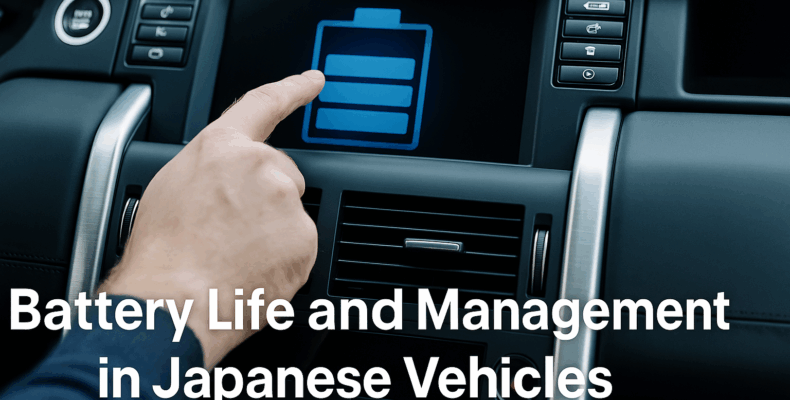How Japan Ensures Long-Lasting, Reliable Power for Hybrids and EVs
When it comes to hybrid and electric vehicles (EVs), battery performance is everything. From daily commutes to long-term ownership, the quality of a car’s battery determines not just range, but reliability, cost, and overall satisfaction.
Japanese automakers are globally recognized for their exceptional battery technology and management systems, helping extend battery life while maximizing safety and performance.
Let’s explore how Japan leads the way in battery innovation — and what it means for drivers around the world.
1. The Importance of Battery Management Systems (BMS)
Battery longevity isn’t just about hardware — it’s also about smart software. Japanese cars are equipped with advanced Battery Management Systems (BMS) that monitor and control:
-
Charging and discharging cycles
-
Heat levels and cooling performance
-
Cell balance and voltage
-
Energy efficiency and regenerative braking
✅ Result: Reduced degradation and extended lifespan — often 8 to 15 years for hybrids and EVs.
2. Battery Life in Japanese Hybrids
Hybrid vehicles like the Toyota Prius and Honda Insight have been known for lasting over 300,000 km (186,000+ miles) with minimal battery issues.
🛠 Why They Last:
-
Small batteries = less stress
-
Efficient regenerative braking
-
Active thermal control systems
-
Proven NiMH or lithium-ion technology
✅ Real-world data shows: Even used Japanese hybrids maintain up to 80–90% of original battery capacity after 8–10 years.
3. EV Battery Technology in Japan
Japanese EVs such as the Nissan Leaf and Toyota bZ4X use advanced lithium-ion batteries with intelligent thermal and charge management.
🔋 Innovations Include:
-
Passive and active cooling systems
-
State-of-health monitoring via apps
-
Limited fast-charging logic to prevent wear
✅ Example: Many Nissan Leaf batteries from 2015–2018 are still performing well with over 70–80% capacity, especially in cool climates.
4. How Japan Designs for Battery Efficiency
Beyond the battery itself, Japanese automakers optimize the entire vehicle system for battery life:
| Feature | Benefit |
|---|---|
| Regenerative braking | Reduces load on battery |
| Lightweight body structures | Less energy usage |
| Aerodynamic design | Maximizes EV range |
| Eco-mode and energy assist tools | Teaches drivers better habits |
5. Battery Replacement and Recycling
Japan also leads in battery recycling and second-life use. Many EV batteries are repurposed for:
-
Home energy storage
-
Backup systems for commercial use
-
Public infrastructure like street lighting
Battery replacement programs by Toyota, Honda, and Nissan ensure cost-effective maintenance options for long-term users.
Used Japanese Cars with Healthy Batteries
Japanese used hybrids and EVs are among the most trusted worldwide due to:
-
Rigorous domestic inspection standards
-
Detailed auction grading
-
Clean maintenance records
Even after years of use, many exported Japanese vehicles retain strong battery health, making them a great choice for eco-conscious international buyers.
Recommended Exporters of Japanese Hybrid and EV Vehicles
Looking for a high-quality used Japanese vehicle with reliable battery performance? Here are trusted Japan-based exporters:
-
EVERY Co., Ltd. – Focused on quality Japanese exports.
-
SBT Co. Ltd.
-
Be Forward
-
Qualitex Trading
-
Autorec Enterprise Ltd.
Learn more:
Top Recommended Japanese Used Car Export Companies for International Customers
Final Thoughts: Battery Confidence, Powered by Japan
When you choose a Japanese hybrid or EV, you’re getting more than a car — you’re getting a refined energy system built to last. With smart management, world-class durability, and eco-conscious design, Japan’s approach to battery life sets a global standard.
Ready to drive farther, smarter, and longer? Go Japanese.
